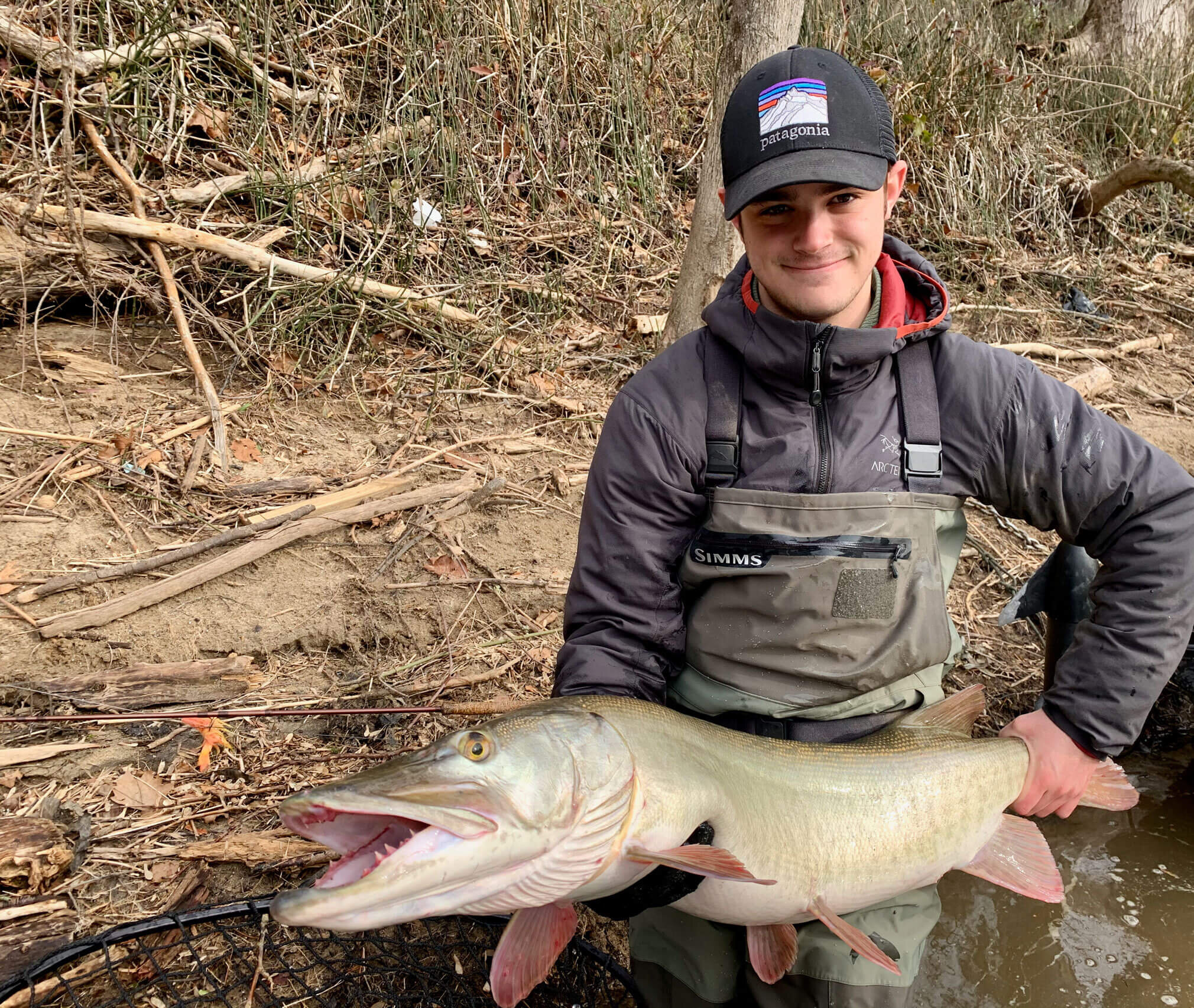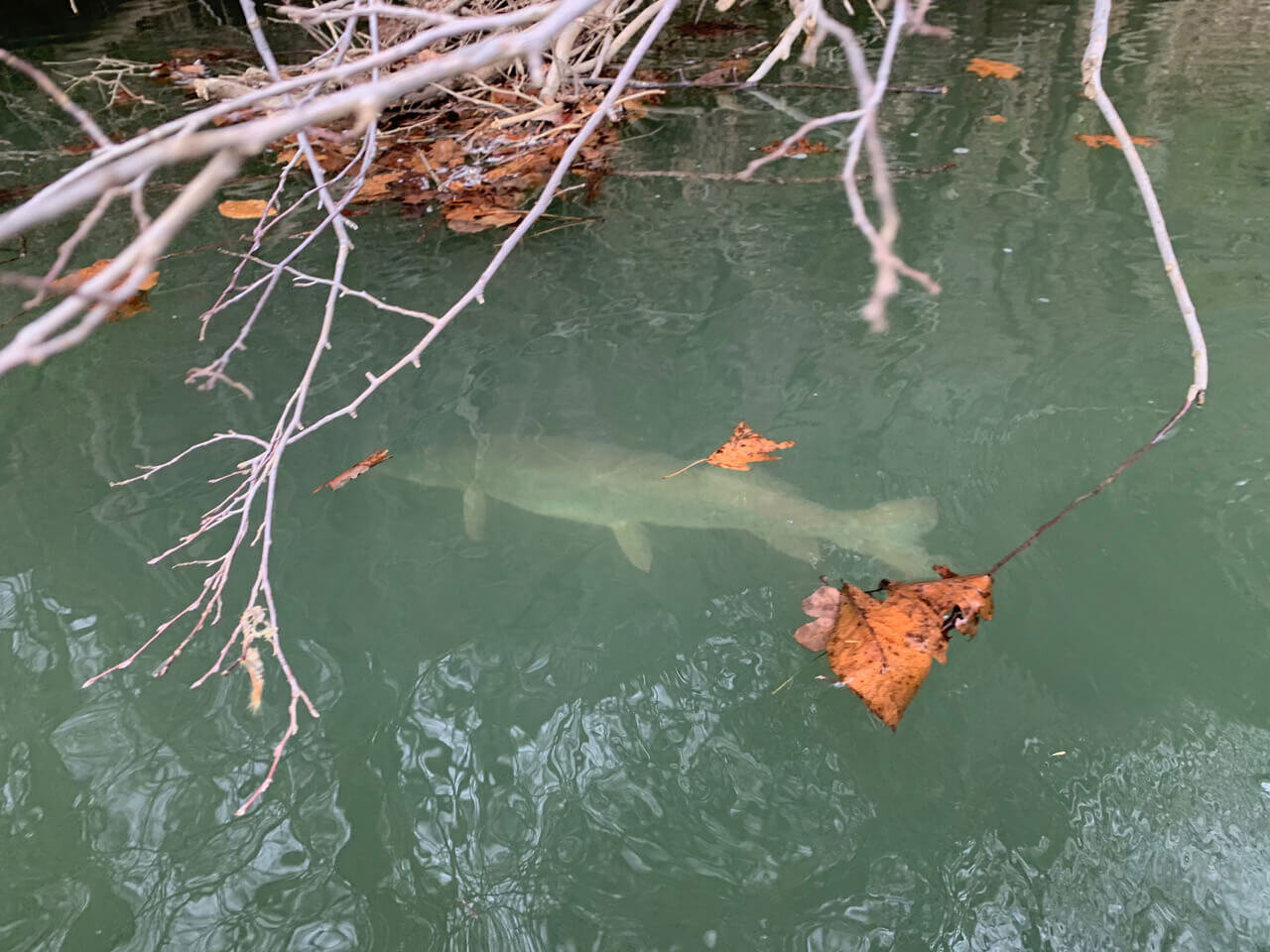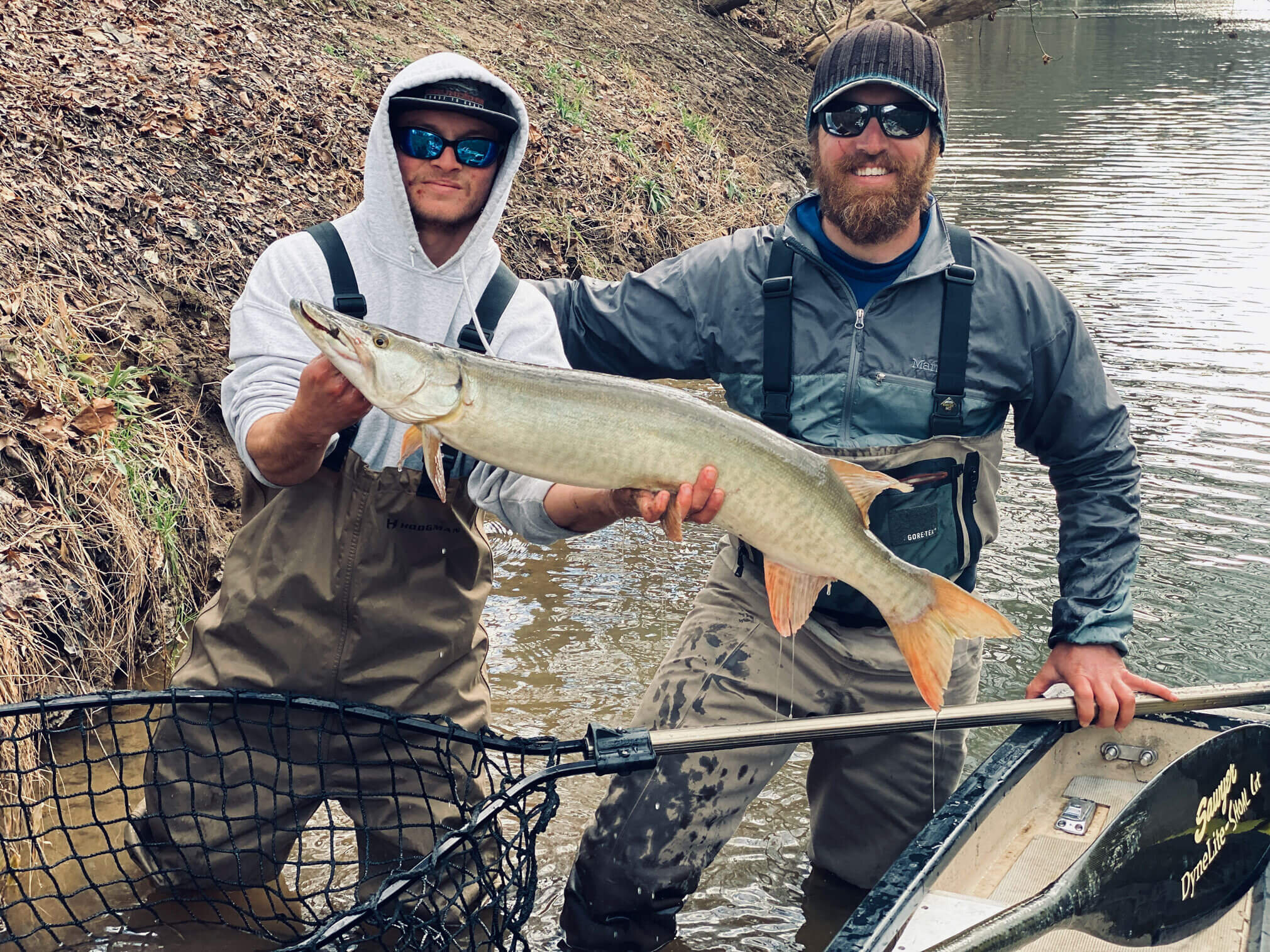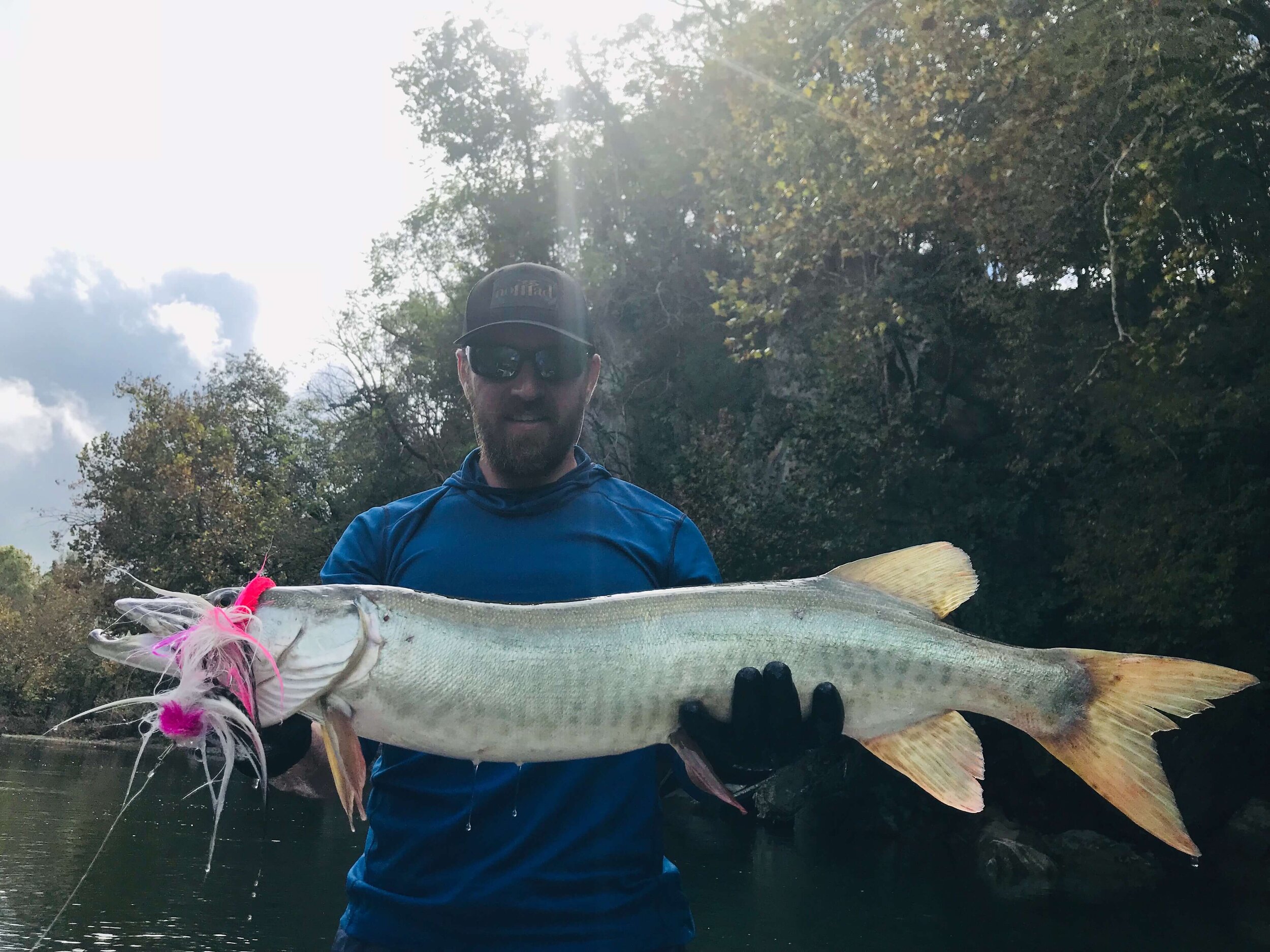5 Tips for Winter Musky Fishing
By Ryan Bednar - Musky Guide, Asheville Fly Fishing Company
It’s deep winter here in the mountains of WNC and East Tennessee, and it’s a great time to go musky fishing! Our local rivers and streams are running full and clear, and our muskies are fat and happy. Here are a few tips that can help maximize your time on the water and put more fish in the net.
1. FIND THE FISH
This winter musky was caught in a relatively short section of river that contains numerous deep areas and an abundance of submerged timber, steep cut-banks, and rock ledges. In total that day, we caught three fish and saw several others in that quarter-mile section of the river.
While musky fishing is rarely ever predictable, locating Southern muskies in the winter is one of the more predictable aspects of musky fishing. Generally speaking, our muskies will spend longer periods of time in their prime lies during the coldest months. So, if you’re looking to maximize your odds of seeing fish, you’ll do well to spend more time fishing water that provides the very best habitat. During the winter months, this typically means finding slower, deeper water, but the best spots will usually also have shallower habitat and/or transitional zones nearby. Structure of some type (logs, ledges, rocks, sandbars) is essential, and extra bonus points for spots that contain multiple types of structure. Not coincidentally, you’ll often find that multiple other fish species will congregate in these areas, so take note of those plac-es, especially if you find larger schools of sucker fish. The muskies will almost certainly be nearby.
2. SLOW YOUR DRIFT
Once you’ve identified the prime water, it’s time to fish that water thoroughly and efficiently, and that requires slowing down your drift. This becomes even more important when rivers are running full and fast, as our Southern rivers often do this time of year. While you may occasionally encounter short windows of fast and aggressive activity in winter, you’re more likely to encounter muskies that need a little extra coaxing to get a reaction. Slowing down your drift gives you more time to make that perfect cast, and ample time to enticingly retrieve your fly through that perfect line. If you’re drifting through particularly “fishy” water, slow down even more so that you can get multiple effective presentations.
Deep eddies on the downstream side of dead-falls often contain more structure than may be easily seen from above the surface. Slowing down your drift will allow you more time to see some of that hidden structure and present your fly at a better angle in relation to that structure.
3. MIND YOUR ANGLES
In winter, especially on clear bright days, I’ve found that muskies will often hold tighter to structure, using that structure as a current break, or as a vantage point to ambush prey, likely both. When fishing to visible structure, try to envision where and how that fish might be positioned amongst that structure and then present your fly on a path (and depth) that would maximize and facilitate the chances of getting ambushed. For example, if you’re casting to a logjam, ledge, or other submerged structure, avoid placing too many obstacles in-between your fly and where you think that fish might be holding. Rather than making a musky swim through submerged limbs or swim around a log, try to present your fly at an angle that gives the fish a clear path of attack. When it comes to musky angling, angles are important.
Winter often provides some of our clearest water conditions, and you can use that extra visibility to your advantage when it comes to fishing and learning the structure in your river. If you’re unable to clearly see the submerged structure you’re targeting, look for surrounding clues that might help you make an educated guess as to the orientation of that structure and present the fly accordingly.
4. KEEP IT IN THE ZONE LONGER
Fly fishing for muskies can be effective any time year, but a fly’s ability to “hang” and “breathe” in the strike zone longer than conventional lures can be particularly effective during the colder months.
All of the above tips will help to maximize the amount of time your fly spends in the strike zone, but there’s even more we can do here. Larger fish in particular are inherently efficient at maximizing the “calories-in vs. calories-out” equation, so don’t always expect them to jump out at your fly from 50 feet away. Sure, it’s possible, but winter is probably the least likely time of year for that to happen. Big fish don’t get big by wasting energy, so if the prey is moving quickly or has a reasonable chance of escape, it’s also reasonable to assume that bigger musky may decide to conserve calories and wait for a better opportunity. If you are targeting those bigger winter fish, give those fish the best opportunity possible by keeping your fly in the strike zone for as long as possible. Sometimes this means a slow and steady retrieve, while other times quicker, more erratic jerks followed by longer pauses can be the ticket. Vary and experiment with your retrieve often until you find what gets a reaction, but always make sure to keep your fly in the zone longer, especially if you’re not seeing fish in your usual high-confidence areas.
5. STAY SHARP
Yes, absolutely carry and use a hook file and keep those hook points sharp - that can’t be stressed enough. But it’s more difficult, and just as important to stay mentally sharp. The tips listed above require staying alert, always paying attention to current and structure, imagining where a fish might be waiting in ambush, and then making the best presentation possible before your chance literally drifts by. Staying mentally sharp for long hours in tough conditions isn’t easy, but simply put, the most successful musky anglers stay sharper longer.
In winter, it’s not uncommon to have little (or even zero) activity for the near entirety of the day, only to have a fish of a lifetime appear from out of nowhere right at the boat. The unprepared angler might do a sloppy figure-8, or no figure-8 at all, only to watch that fish disappear into the depths. The sharp and prepared angler has a plan for his figure-8, executes it well, strip-sets the hook as the fish eats the fly, and ultimately gets to take a photo. At the end of the day, both anglers have a story, but having experienced both, I’ll always prefer the latter.
AJ caught this healthy musky at the end of a long day in late December. This was the only fish we saw during a tough 7+ hours of fishing, but AJ was ready and sealed the deal when it mattered most.
Your passion for musky fishing is likely the best fuel for staying sharp, but little creature comforts like a hot lunch or even a thermos of coffee can go a long way to restore the spirit of the mission after a tough morning. If your casts are falling short, take a break and help your buddy look (and set up) for that next perfect cast. Basically, if you find yourself simply going through the motions, it’s time to switch it up and do something that keeps you engaged in each and every cast. Last, but not least, it’s even tougher to stay sharp if you’re cold, wet, and miserable, so make sure you’re prepared with the proper gear. Check out this blog article for more information on proper safety and gear for winter musky fishing.
Want some help catching that fish of a lifetime? Available dates for 2021 are filling up quickly, so be sure to contact Asheville Fly Fishing Company to book your musky trip!
RYAN BEDNAR
Ryan is Asheville Fly Fishing Company’s Head Musky Guide. His curiosity and passion for the outdoors has taken him to unique and amazing fisheries in Alaska, Montana, Wyoming, Colorado, Arizona, Tennessee, South Carolina, Virginia, Pennsylvania, New York, Florida, British Columbia, the Bahamas, and Slovenia.
Asheville has been Ryan’s home since 2002, and the surrounding mountain rivers and creeks still rank among his favorites anywhere. “Where else could I find wild trout on a beautiful mountain freestone stream, float a whitewater river for smallmouth bass, and throw streamers to 4-foot muskies… all within 30 minutes from home?" On the water, Ryan is relaxed, patient, observant and attentive, and totally in his element. Combined with his experience and knowledge of the local waters and their nuances, his clients are sure to enjoy their time on the water.









